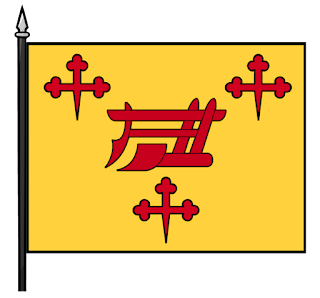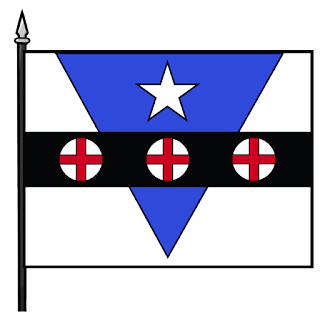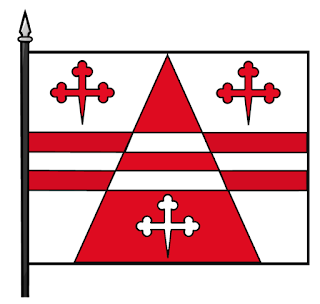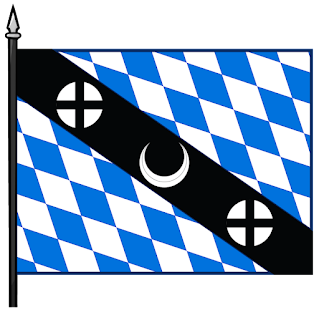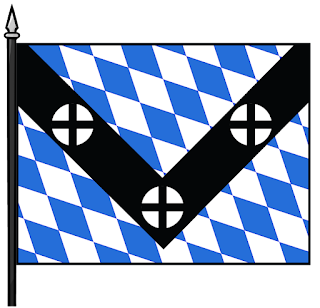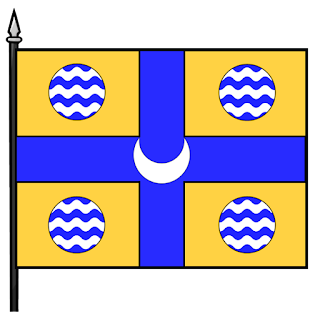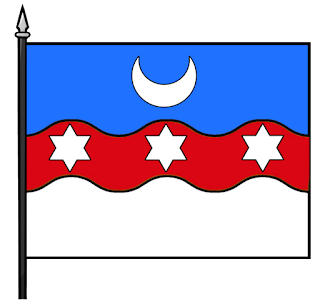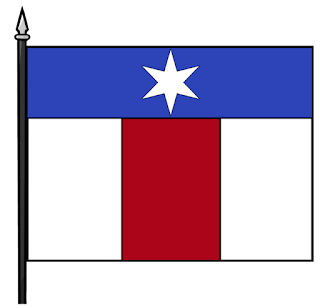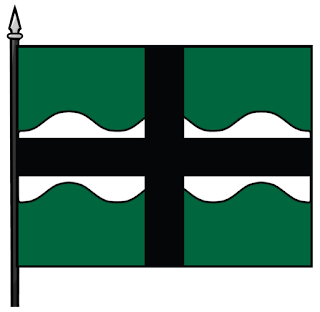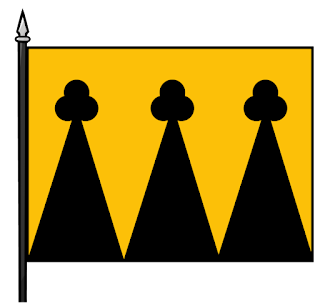 |
St. Edward's Seminary in Kenmore, WA.
Photo: Wikipedia. |
Jointly operated in 1930 by the Archdiocese of Seattle (then it was a diocese) and the Society of the Priests of St. Sulpice, the seminary trained clergy until its doors closed in 1976. The property is now a state park and the physical building is now something of a resort destination.
The Lodge occupies the former seminary offering luxury amenities. If only those walls could talk...
 |
| Line drawing of the new arms for St. Edward's Seminary by la Rose in 1931. I've spent time cleaning up the image as the original was quite bad. |
During the passage of time, the Friends blog has since been replaced and the article lost. I am so thankful that I captured the data when I did. The blog article from August 31, 2013 shares a letter from la Rose detailing his rationale for the seminary's new design along with a line drawing of the arms as seen above. Usually, la Rose sends these letters directly to corporate sole, and in this case it would have been Bishop Edward John O'Dea (1856-1932):
"Saint Edward himself has a very beautiful coat ascribed him by the medieval heralds-apocryphal, of course, as he lived before the rise of personal heraldry, but still, an actual emblem which he used on his coinage: a cross with five martlets. This in conjunction with the Sulpician emblem, I shall make the basis of a carefully studied design.
"The arms ascribed to Saint Edward by the early heralds consist of a gold cross and five gold 'martlets' on a blue field. The shapes and arrangement are the same as in my own drawing. We may not use this coat unaltered, for to do so would imply, heraldically, that St. Edward was the Founder of the Seminary, instead of being simply its Patron. I have therefore changed the coloring from blue and gold to red and silver - the colors of the diocesan arms. As for St. Edward's cross and martlets, they appear, as I think I told you, on his coins. The significance of the birds I do not know, nor does anyone else. In heraldry they are always shown as having no feet visible.
"On the Sulpician 'inescutcheon' you will note the crescent (of the Immaculate Conception) which distinguishes the American house of the society from the French" (La Rose letter to Bishop Edward O'Dea, February 13, 1931).
And that's all the information we have regarding these arms. There's no blazon, much less any colored emblazonments to be found--I know. The archives of the Archdiocese of Seattle and the Associated Sulpicians of the United States Archives have the letter and line drawing but nothing else.
La Rose never referred to himself as a herald per se, but he did identify as an architect and even an archeologist. It does seem a bit strange given his educational background in English, regardless his designs were informed by human history, the past. To dig up the past in order to create present-day identification--the sole purpose of heraldry--was la Rose's calling in a sense and his letters to clients reflect the seriousness he approached this task.
 |
Comparing the seminary's arms with those attributed to St. Edward the Confessor.
Rendered by Chad Krouse, 2024. |
In every design, la Rose meticulously researched the corporate body, or the individual's familial background, taking into consideration all known data to render clear and perspicuous coats of arms. St. Edward's Seminary is no exception to his keen sense of creatively bringing the past into the present through the abstract language of heraldry.
 |
The coat of arms of St. Edward's Seminary designed by la Rose.
Rendered by Chad Krouse, 2024. |
As a heraldic researcher, I see my task as preserving la Rose's legacy through sharing and education. I was deeply concerned that his design of arms for St. Edward's Seminary was endangered of being erased, and I wanted to ensure that would not happen. Thus I've taken liberties to digitally render these arms myself, however elementary the emblazonments may appear, to ensure posterity of the design.
.png) |
The armorial flag or banner of arms for the Archdiocese of Seattle. La Rose designed the arms in 1919 and the colors of red (Gules) and silver/white (Argent) form the color scheme for the seminary's coat. Rendered by Chad Krouse, 2024.
|
 |
The armorial flag or banner of arms of St. Edward's Seminary.
Rendered by Chad Krouse, 2024. |
As far as I know, this may well be the first time these arms have ever been seen both digitally and in color. The blazon I give for la Rose's design is:
Gules, on a cross floury Argent an escutcheon Azure charged with the Badge of the Society of Saint Sulpice in the United States between five martlets all Argent. This blazon makes the most logical sense given la Rose's description in the letter even though we do not know the tincture for the Sulpician shield, blue seems appropriate.
Because I love armorial flags, I've laid out la Rose's design in this format. I rather prefer the flag to the shield, as the martlets present so many challenges within the confines of the shield's shape for balance and symmetry.
I know of several additional designs by la Rose that equally face eradication. As so many of those institutions bearing arms by la Rose closed towards the end of the 20th century, their muniments have been scattered or simply disappeared altogether. I know of one such case for a college where literally everything has vanished! So, I have my work cut out; I love the thrill of hunting down his designs as I know there must be hundreds buried and in need of some digging.
It's my sincere hope that the arms of St. Edward's Seminary can now be shared and la Rose's design appreciated more widely. It's a lovely design with clear identification and meaning created by the master.

.png)
.png)
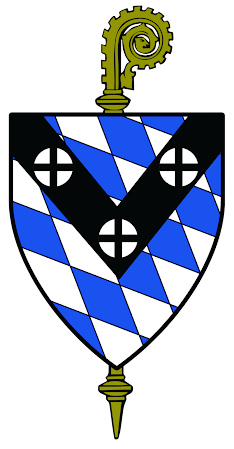
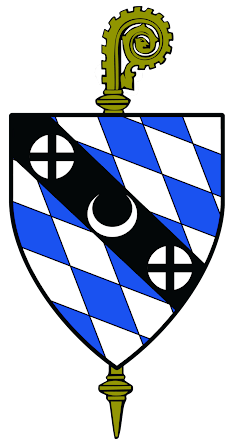





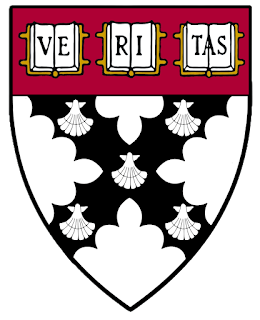

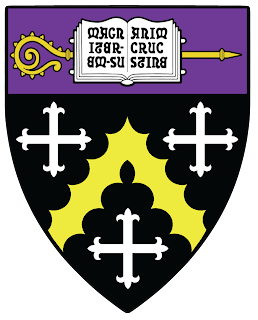
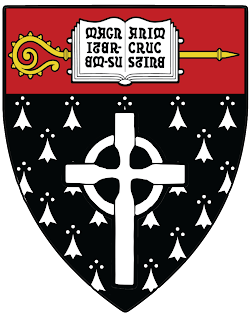
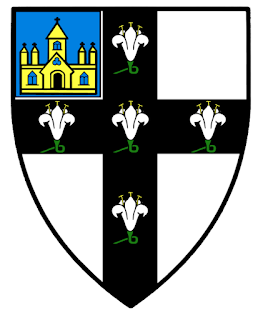



.png)

.png)
.png)
.png)
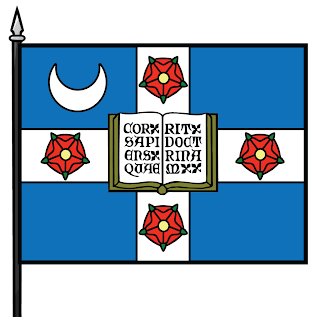
.png)
.png)
.png)
.png)





.png)

.png)

